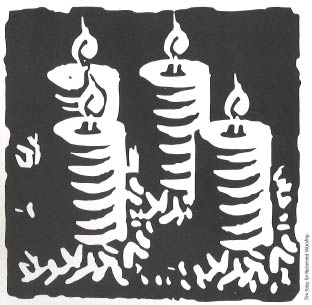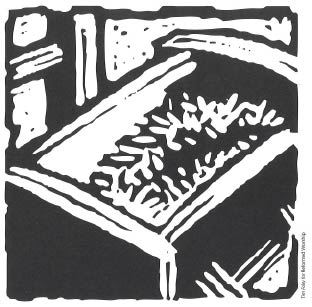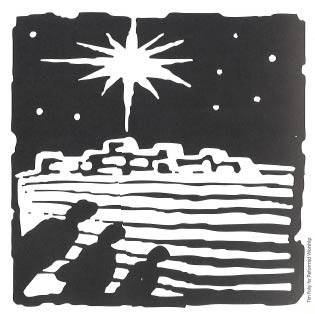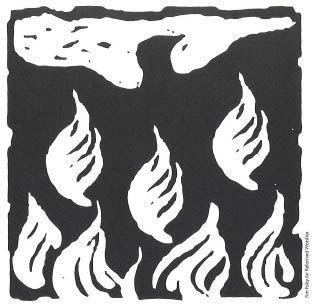From its very beginning in the early seventies, Church of the Servant has celebrated the Lord's Supper every Sunday. When I came to the church, I did not immediately take to the weekly practice. It was not in my past, and I feared familiarity and a wearisome repetitiveness. Over time, however, the practice has become immensely satisfying and an essential part of Sunday worship. It is a focus that I deeply appreciate as a pastor.
For one thing, celebrating the Lord's Supper safeguards the heart of the gospel. If I preach a text that is mostly about conduct, located on the periphery of the Christian faith, the communion liturgy brings us back to the center.
Moreover, celebrating the meal weekly reminds us that the Christian life is not only an intellectual exercise, but also an exercise in community. There is a table, Christ is the host, and we, his siblings, gather at his invitation. We may disagree strongly on this or that interpretation of Scripture, but we all come with empty hands and open mouths to receive from the storehouse of God's goodness.
Besides, the weekly communion tells us that worship is participatory. I must come forward, receive the bread and wine, and, as practiced among us, look my neighbor in the eyes and say, "The body of Christ for you, the blood of Christ shed for you." It is hard to imagine saying anything more meaningful than "The body of Christ for you" to your spouse or child or to another parishioner.
Again the communion liturgy nearly always picks up some word or theme from the sermon, and though we have read the words many times before, we hear them as though for the first time. And always, whatever the sermon, the gospel is enacted and made visible in the communion celebration. The sacrament demonstrates the word preached and anticipates our feasting on the great Day.
In an "As We See It" column in Perspective magazine Kevin Corcoran wrote about the meaning of the sacrament for him during a difficult week after the death of his mother-in-law:
One can tell a story using words or one can tell a story using none. At church we do both. Sometimes, and I wish it were much more frequently a story is told with the stuff of the earth—bread and wine. It was the great sacrament so often neglected by Reformed Christians that I longed for most during that week with my father-in-law. Why? I think because it engages me not just cerebrally but bodily: I taste, touch, see, and smell God's goodness. What I longed for that week was to be reminded of God's own participation in our broken-ness. I wanted to be reminded starkly and concretely that God was with us and that God's promises are true. I wanted also to anticipate the consummation of God's kingdom of shalom. This happens at the table. I wanted to hear the words, "The body of Christ, broken for you," "The blood of Christ, poured out for you." I wanted to hear others tell me the story—or better, I wanted to see others show me the story. I wanted to taste it and to touch it, to smell it and to see it. And yes, also to hear it.
Until I joined Church of the Servant, my focus on the Lord's Supper was on our penitence and Christ's forgiveness. The meal was celebrated in hushed tones, either with absolute silence—even as children we knew that this was a time for silence—or with a silence interrupted only by the pastor reading an appropriate Scripture passage or the organist playing a reflective hymn. In any case, each person sat quietly, alone before a holy God, participating in communion.
These celebrations were often significant times; the silence, the solemnity, the gravity of participation in the communion service were all wonderful. But like any good meal, the Lord's Supper has many flavors, depending on the serving. In fact the seasons of the church calendar will nearly always highlight certain flavors. To explore this variety in the communion service, the following service plans take the Revised Common Lectionary Year A readings for the first Sunday of each of the seasons and suggest how the sermon might season the celebration. Also included is the response portion of the service for each week—the bridge in the liturgy between the sermon and the celebration of the supper. For suggestions related to song selection see Carol Petter's article "Seven Communion Songs Every Sunday: A Musician's View of Celebrating the Supper".
The art highlighted in this article and found below in the resources section is free for non-commercial use with appropriate attribution.
Advent
Living With the End in Mind
Isaiah 2:1-5; Romans 13:11-14; Matthew 24:36-44
Sermon Notes
There are two strikingly different and powerfully competing visions of the end given by the astronomer and the prophet.
The astronomer says our end will come either by ice—some cataclysmic climate change due, perhaps, to a deadly collision with an asteroid or a comet—or by fire—the ballooning of the sun till it ignites into a giant helium flash consuming planet Earth in one fiery blast (Newsweek, Nov. 23, 1992). If the astronomer is right, and his vision of the end is the last word, then there is ultimately no point to all our living. We are all passengers on a Titanic without lifeboats.
The prophet Isaiah has also seen the end; he claims it's full of promise, the culmination of God's desire to establish shalom. He speaks of the end of the world not as a time of disaster but as the time when the earth's goal has been reached. In the end there will be great rejoicing, and all nations will participate.

Each of us must decide which vision of the end is true. Advent urges us to stand behind the prophet—not because the prophet knows the flight patterns of comets and galaxies but because the prophet has read the heart of God. The community of faith says that Bethlehem, the upper room, Calvary, and an empty grave give us our best reading of our final destination.
Since no one knows the day of that great consummation, Jesus warns against indifference, moral recklessness, and absorption in the routines of ordinary life. He would have us live each day in such a way that the end will not be an unwelcome intrusion. We're to conduct ourselves like the student whose study habits keep her ready for any surprise quiz. Moreover, the apostle Paul tells us that if we are to live with the end in mind, we must put aside the deeds of darkness and clothe ourselves with the Lord Jesus Christ today.
In receiving the bread and wine, we publicly declare on which side of the two competing visions of the end we stand, with which end in mind we will live. Because of Jesus Christ, we anticipate an end that is not a bang and then total darkness, but rather communion, feasting, and great praise.
"Come, let us walk in the light of the Lord."
Response
[For each service, the Response section is what follows the Proclamation and precedes the Lord's Supper.]
Song or prayer of application
Leader: Let us together profess our faith.
All: I know that my Redeemer lives,
and that he shall stand at the latter day
upon the earth.
and though worms destroy this body,
yet in my flesh shall I see God;
for now is Christ risen from the dead,
the firstfruits of those that sleep.
Since by one came death for all,
by one came also the resurrection of the dead.
For as in Adam all die,
even so in Christ shall all be made alive.
Hallelujah, the Lord God omnipotent reigns!
The kingdom of this world is become
the kingdom of our Lord and of his Christ;
and he shall reign for ever and ever,
King of kings and Lord of lords. Hallelujah!
Intercessory prayer (led by a member of the congregation)
CHRISTMAS
Coming Home
Jeremiah 31:7-14; John 1:10-18
Sermon Notes
During Advent we sing:
0 come, O come, Immanuel,
and ransom captive Israel
that mourns in lonely exile here
until the Son of God appear.
The song resonates deep within us. Like the people to whom Jeremiah writes, we know of the exile; there are seasons when we feel we live in exile still. Like the people to whom John the apostle writes, we know of the darkness; there are times still when that darkness threatens to invade our souls.

The dictionary defines living in exile as a prolonged, mostly involuntary separation from one's country or home. That exile can be physical, psychological, or spiritual. We were exiled from the garden. The psychiatrist Paul Tournier explores this terrain in his book A Place for You. Today we are told that some people who are much abused as young children suffer from Attachment Disorder. They find it impossible to connect, to feel at home anywhere. In her novel Larry's Party, Carol Shields tells us that when Larry celebrates his fortieth birthday, a seam of panic opens up inside of him. He feels disconnected, in a maze with no exits, living on the verge of nothing at all.
Our world experiences such a profound sense of exile that talk of a homecoming sounds naive, quaint maybe, altogether out of touch. Yet both the prophet Jeremiah and the apostle John invite us to come home:
They shall come and sing aloud on the height of Zion,
and they shall be radiant over the goodness of the LORD...
their life shall become like a watered garden,
and they shall never languish again.
Then shall the young women rejoice in the dance,
and the young men and the old shall be merry.
1 will turn their mourning into joy,
I will comfort them, and give them gladness for sorrow
. . . says the LORD (Jeremiah 31:12-14, NRSV).
Here is a place to come home to that flourishes with abundance, that rings with song.
The possibility of such a homecoming has its basis in God's action, not in any New Year's resolutions or government programs. In Jeremiah, God is the primary actor, and in John's gospel our homecoming is grounded in the fact that the Word became flesh and made his dwelling among us (v. 14).
Our task is to accept the invitation to come home. We are to go to Bethlehem, where God was homeless and all of us can find a home. The gospel tells us that many did not believe, but that for those who believed, it made all the difference. They were given the right to become children of God and to be home at last.
Yet, because we sin and suffer the ravages of sin, we all suffer from a form of Attachment Disorder. We find it difficult to trust the promises of the gospel. We keep turning away. A teenage boy, after much abuse as a child, was adopted at the age of seven. His Attachment Disorder was so severe that he found it difficult to look his parents in the eyes when they spoke with him. Sometimes, with great tenderness, the father or the mother would take the boy's face in their hands, look him in the eyes, and say, "Listen, son, we're on your side; please, we're on your side."
At Christmas God takes humanity's face in his hands, turns it towards him and says, "I'm on your side." At every communion service God takes our faces in his hands again, turns us towards him, and tells us, "I'm on your side! You are no longer in exile but adopted and at home with God."
Response
Prayer for blessing upon the Word
Leader: Let us join with Mary and with all the saints
in our profession of faith and praise:
All sing: The Magnificat (the Song of Mary)
Intercessory Prayers
EPIPHANY
The Church of God
Isaiah 49:1-7; 1 Corinthians 1:1-9
Sermon Notes
Everywhere we hear talk about the health of the church. Many believe that her vital signs are not good. One writer wonders out loud who is to blame, pew or pulpit, and quotes the observation that when you have a dead fish, it's the head that stinks first.
Paul is writing a letter to a church that can only be described as dysfunctional. Yet he addresses her as the church of God in Corinth, as those sanctified in Christ Jesus and called to be holy. Some suggest that perhaps Paul is being facetious, or that he's exercising a false optimism that runs on the assumption that emphasizing the positive is good psychology.
As a matter of fact, Paul is stating rock-bottom facts. It's not that he is blind to the church's problems; it's just that he sees deeper and further than most of us.
We are defined by our position in Christ; it's what some call a positional sanctification. Our identity is not determined primarily by our good or bad behavior but by our relation to God through Christ. In theology we find the doctrine of transubstantiation. According to this doctrine, during the celebration of holy communion, when the priest prays the prayer of consecration, the essence of the bread is transformed into the body of Christ, even while the bread's accidental characteristics remain the same. It is not what most Protestants believe. Yet might not that doctrine be applied to the church? She still looks and feels and sounds like a body of ordinary sinners but, as a matter of fact, at the core she has changed radically. If we could see deeply enough into her, we would see not sinners but Jesus Christ. It is a matter of faith seeing deeper.

More, it is a matter of seeing further. We need a faith that sees the church as she will be in the end. In verses 8-9, Paul voices great expectations. Traditionally we've distinguished between the visible and the invisible church. We realize that the community of believers includes many who are not real believers but at best Christians only in name and at worst hypocrites. The real church, then, are those within the visible church who are united by a true faith. But such thinking seems to assume that there are two churches, rather than one church that is groaning "inwardly while we wait for adoption, the redemption of our bodies" (Rom. 8:23, NRSV). As Richard John Neuhaus argues, it is better to view the church in terms of possibility and promise. This is not to depart from reality but to encompass the greater reality. It is not simply a projection of a wish or of a worthy dream, but it is a possibility derived from the promise of God himself. Faith sees and loves the church as she will be because God is faithful.
To love this church means we do all we can to help her become what she is in Jesus Christ. Martin Luther King, Jr., observed that whom you would change you must first love. A superior stance, a sneering attitude, a condescending look sabotages any and all efforts.
To sustain our love for the church we must see her at the table with Christ as the host. Here, in communion, you see what seems like nonsense to unbelievers—siblings of the Lord, a glorious bride.
In this holy communion, faith sees deeper and further; it sees the church of God in Corinth or in Chicago, ordinary men and women sanctified in Christ Jesus, called to be holy.
Response
Song or Prayer of Application
Leader: Let us together confess the faith of the church at all times and in all places.
All: The Nicene Creed
Intercessory Prayer
LENT
Death and Life
Genesis 2:15-17; 3:1-7; Romans 5:12-19; Matthew 4:1-11
Sermon Notes
Some time ago the magazine GQ did a survey of fifteen hundred men, eighteen years and older. In the survey the men were asked to pick ten adjectives out of a total of forty-six that best described them. The words the men used to describe themselves were honest, kind, polite, intelligent, competent, loyal, independent, practical, fan-loving, and happy. Then they chose ten adjectives that best described how they would like to be seen: high-earning, patient, attractive to women, sexy, athletic, good-looking, social, decisive, assertive, well-educated. Plainly these men see themselves as basically good; the only thing they would like just a little more of is clout, especially in the eyes of women. I did not see the original list; perhaps it included adjectives like sinister, self-serving, holy... Still, it makes you wonder. If this survey reflects the way people see themselves, how do they explain that this is such a sad and dangerous world?
And how do they make sense of a church that raises such a fuss over the need for redemption? Who needs Lent? Is it all for the other person? Of course, there are other, more reliable readings of the human heart, readings more in line with the Bible. For example, in one of his recent collections of short stories, the novelist John Updike writes:
You land, it seemed to him, on the shore of your own being in total innocence, like an explorer who was looking for something else, and it takes decades to penetrate inland and map the mountain passes and to trace the rivers to their sources. Even then, there are large blanks, where monsters roam.
—The Afterlife, p. 243
The self is a continent where monsters roam, and it was sin that opened the door to the monsters. "Therefore, just as sin came into the world through one man, and death came through sin, and so death spread to all because all have sinned" (Rom. 5:12, NRSV). Sin had its debut in the beginning, in the garden, and death came hard on its heels. As the Bible reads us, we are the walking dead; even the ground is cursed because of sin.
But, says Paul, where Adam failed, Christ succeeded. Jesus Christ is the one who begins a new humanity. He is not to be compared with anyone out of the salvation history of Israel. He is no Abraham or Moses or Elijah. He can only be compared to the one who began humanity, Adam.
In Adam and in Christ we have two fountain-heads, two rivers, two powers, two kingdoms. In the one we find the power of sin, a rebellion against God that brings death, and in the other we find grace, a reliable access to God that brings life. We ourselves could not round up the evil that has been set loose on our earth and restore the garden, nor tease the evil out of our own hearts to make ourselves pure. Our only hope is to accept Christ's relocation program. To be saved means to be rescued "from the dominion of darkness and brought... into the kingdom of the Son he loves in whom we have redemption, the forgiveness of sins" (Col. 1:13-14).

Lent calls us not only to an honest appraisal of who in the world we are, acknowledging the monsters that roam there, but also, and especially, to entrust ourselves to the One who is our Redeemer. In him, as citizens in his kingdom, we are safe; sin, death, and the devil have no power or authority over us anymore.
A liturgy for Lent includes the following exchange:
Minister: He is the bread of life, who came down from heaven to give life to the world. Whoever eats this bread will live forever.
People: Lord, give us always this bread of life.
Minister: Lamb of God, who took upon himself the sins of the world; whoever accepts this sacrifice is forgiven before God.
People: Lord, move us always to receive this gift.
Minister: He is the servant of the Most High, who remained obedient even to death by execution; whoever serves him is liberated for life.
People: Lord, grant us always true obedience.
Martin Luther had it right:
Did we in our own strength confide,
our striving would be losing,
were not the right Man on our side,
the Man of God's own choosing. You ask who that may be?
Christ Jesus, it is he;
Lord Sabbath his name,
from age to age the same;
and he must win the battle.
Response
Hymn: "Breathe on Me, Breath of God" (stanzas 1 and 2)Hatch
Leader: Let us express our unity with the church of all ages by professing our faith in the words of the Apostles' Creed:
All: The Apostles' Creed
Intercessory Prayer
EASTER
While it was Still Dark
John 20:1-18; Acts 10:34-43
Sermon Notes
In the movie "Before and After", a young girl reflects on a murder that she says divided her family's life into "before" and "after." Nicholas Wolterstorff makes a similar observation in his book Lament for a Son. About his son's death he writes:
The world looks different now.... Something is over. In the deepest levels of my existence something is finished, done. My life is divided into before and after (p. 46).
John's gospel tells us that "early on the first day of the week, while it was still dark, Mary Magdalene went to the tomb and saw that the stone had been removed from the entrance" (v. 1). Mary does not yet know that something has happened that has made life altogether different. For her it is still dark, this world is still the place where all the living can do is bring spices to lessen the stench of death.
John and Peter also remain in the dark. They stand in the empty tomb dumbfounded, unaware that life has entered a wholly new phase. All they see are the scraps of fabric; they believe with Mary that some scoundrel has made off with Jesus' body. In fact, John tells us straight out, they still did not understand from Scripture that Jesus had to rise from the dead.
The most obvious reason for their unbelief is realism. The fact is that once death has someone in its clutches, its stranglehold is permanent. We all know this. The dead stay dead. Not one casket lowered into this grave-littered planet is rented. Death plays for keeps.

In the face of death, the world's advice is for us to grow up and become adults. Be realistic, it says. Adjust to death. You gather your posies, you snatch your pleasures, but always there is death standing behind you and whispering, "Save the last dance for me."
The two disciples leave the tomb frustrated and confused, their realism holding fast. Mary stays. Left alone at the tomb she continues the "adjustment." Sobbing, she stumbles to her knees and catches a glimpse inside the tomb. What was empty she finds occupied by two figures in white, one of whom asks the question, "Woman, why are you crying?" It is a surprising thing to ask; after all, crying is the code of conduct in graveyards.
Mary responds as before, "They have taken my Lord away."
The writer notes no response from the angels before Mary turns. There stands another figure, as much a stranger in Mary's eyes as the two reclining inside. This one also asks, "Woman, why are you crying? Who is it you are looking for?"
Under the influence of realism, she thinks it's the gardener, and she hopes that maybe he can end this agony, maybe point her to another tomb. "Sir," she says, "if you have carried him away, tell me where you have put him, and I will get him." Of course, in this most wonderful scene, he doesn't answer the question. He simply calls her by name, "Mary," and thereby reveals his own identity.
"Rabboni (Teacher)!" she cries, and she falls at his feet to embrace him with all the passionate feeling she possesses. Again we must not suppose that Mary fully sees that it's over, that she is living in the after. Jesus has to tell her in effect, "Mary, let go of me. We cannot return to the days before. Things are different now. And you are to tell the disciples that I will ascend to your Father and my Father, to my God and your God."
Mary does as Jesus commands. She lets go and returns to the disciples. "I have seen the Lord!" she shouts. The cry heralds that life is now divided into before and after. When God raised Jesus from the grave, he split our history in two.
We celebrate Easter to tell all the world: "Death has lost its hold on us. The last dance belongs to Christ. Things have changed. We are living in the after." Jesus is a death-conqueror.
Still the darkness holds.
To sustain the conviction that we are living in the after while it is still dark, we gather on Sunday. Christ appeared to the disciples on that day; he made himself known to them in the breaking of bread. In our gatherings we pray for Christ's presence—that he will speak to us through Word and Spirit—and for eyes that will recognize him in the breaking of bread.
In the book Sleeping with Bread, the authors tell us that during the bombing raids of World War II, thousands of children were orphaned and left to starve. The fortunate ones were rescued and placed in refugee camps, where they received food and good care. But many of these children who had lost so much could not sleep at night. They feared waking up to find themselves once again homeless and hungry. Nothing seemed to reassure them. Finally, someone came upon the idea of giving each child a piece of bread to hold at bedtime. Holding their bread, these children could finally sleep in peace. All through the night the bread reminded them, "Today I ate, and I will eat again tomorrow."
Christ's resurrection is our loaf of bread. We still bring fathers and mothers to the grave—and sometimes even sons and daughters. It is still dark. Yet with bread in hand we live in the confidence that "just as we have borne the image of the man of dust, we will also bear the image of the man of heaven" (1 Cor. 15:4, NRSV).
Response
The Creed
Minister: Let us join together in love, and with one heart and one voice confess the faith of the church at all times and in all places.
People: The Nicene Creed
Intercessory Prayer
PENTECOST
WHEN PENTECOST CAME
Genesis 11:1-9; Acts 2:1-21
Sermon Notes
On Pentecost Sunday does the silence of this worship hour trouble you? There is no sound as of a rushing wind, no tongues of fire. Perhaps, as I once heard it explained, it's like plumbing. The plumber shuts the main valve, empties the pipes of water, and does his repairs. When he opens the valve again, water rushes in with a great noise, the pipes rattle and shake, you fear the whole house may come down. Then when all the pipes are full, the quiet returns, and the water is as near as a turn of the faucet. Though all is quiet, the Holy Spirit is as near as the water in the pipes, as air in our lungs.
In the book of Acts, the coming of the Holy Spirit is accompanied by three supernatural signs: a sound like that of a rushing wind, the sight of what seemed to be tongues of fire, and the speaking in other tongues.
Each tells us something about the nature and work of the Holy Spirit. The sound like a violent wind from heaven tells us that the presence of the Spirit communicates life and power. It is a power that enables us to see the truth about Jesus Christ. Until the day of Pentecost the disciples had been looking at Jesus from the outside, as you might look from the outside at the stained-glass windows in a great cathedral. They appear mute, dead. They have nothing to say. But on Pentecost the disciples began seeing Jesus from the inside, and, like the windows of a cathedral seen from the inside, with light streaming through them, they became alive and glorious. Once Peter had the Spirit, he could not stop talking about the way God had exalted Jesus Christ. Pentecost is the power that moves us inside Jesus, and when that happens, we are energized.
Then, second, "they saw what seemed to be tongues of fire that separated and came to rest on each of them" (v. 3). John Stott explains that the fire symbolized purity, sanctity. The Holy Spirit brings about holiness, not in a narrow legal sense, but in the breath-taking sense of living lives that share in the life and character of God. We are often told that the two characteristics of a revival are an increased emphasis on prayer and a deep repentance that involves both sorrow for sin and an enthusiasm for holiness. Both speak of a renewed communion. Because of the Holy Spirit we are linked to God. We enter a divine fellowship.

And finally, when they were filled with the Holy Spirit, people heard them speaking in other tongues (v. 4). The miracle of speech stresses the universality of the gospel. It is for all people. On that Pentecost day in Jerusalem, the whole world was present, and the disciples were sent into all the world. It is Babel reversed. With the saints we sing
"You are worthy . . . for you were slaughtered and by your blood you ransomed for God saints from every tribe and language and people and nation" (Rev. 5: 9).
Pentecost is the culmination of Easter. The almighty and everlasting God fulfilled the Easter promise by sending the Holy Spirit. His coming anticipates the end; God is at home among us. "He will dwell with them as their God; they will be his people, and God himself will be with them..." (Rev. 21:3).
When we gather around the table, we show that we are at home with God and that God is at home with us. This is the work of the Holy Spirit.
There is a scene in the book "Ladder of Years" by Anne Tyler that captures our table fellowship together:
Nat said, "Do any of you know the photographs of C. R. Savage?"
The grownups turned courteous, receptive faces in his direction.
"A nineteenth-century fellow," he said. "Used the old wet-plate method, I would suppose. There's a picture I'm reminded of that he took toward the end of his life. Shows his dining room table set for Christmas dinner. Savage himself sitting amongst the empty chairs, waiting for his family. Chair after chair after chair, silverware laid just so, even a baby's high chair, all in readiness. And I can't help thinking, when I look at that photo, I bet that's as good as it got, that day. From there on out, it was all downhill, I bet. Actual sons and daughters arrived, and they quarreled over the drumsticks and sniped at their children's table manners and brought up hurtful incidents from fifteen years before; and the baby had this whimper that gave everybody a headache. Only just for that moment," Nat said, and his voice took on a tremor, "just as the shutter was clicking, none of that had happened yet, you see, and the table looked so beautiful, like someone's dream of a table, and old Savage felt so happy and so—what's the word I want, so ... "
But now his voice failed him completely, and he covered his eyes with one shaking hand and benthis head. "So anticipatory!" he whispered into his plate... (pp. 320-321).
Communion on this Pentecost day is so anticipatory.
Response
Hymn
Intercessory Prayer
Affirmation of Faith
Leader: As servants of Jesus Christ,
we declare with joy and trust:
Our world belongs to God!
God reigns! Let the earth be glad!
Christ is Victor; his rule has begun. Hallelujah!
The Spirit is at work, renewing the creation.
Praise the Lord!
Jesus is with us through the Spirit,
who renews our hearts, moves us to faith,
leads us in the truth, upholds us in our need,
and makes our obedience fresh and vibrant.
The Spirit thrusts us into worldwide mission,
impels young and old, men and women,
to work at home and abroad in every area of life
with the good news of God's grace.
The Spirit's gifts are here to stay in rich variety—
each one given for the common good.
We see each other as members of Christ's body,
empowered by the Spirit to praise God,
love our neighbor,
and bring healing to this broken world until every
inch of creation declares, "Jesus is Lord!"
—taken from Our World Belongs lo Cod, A Contemporary Testimony (PsH p. 1019).

